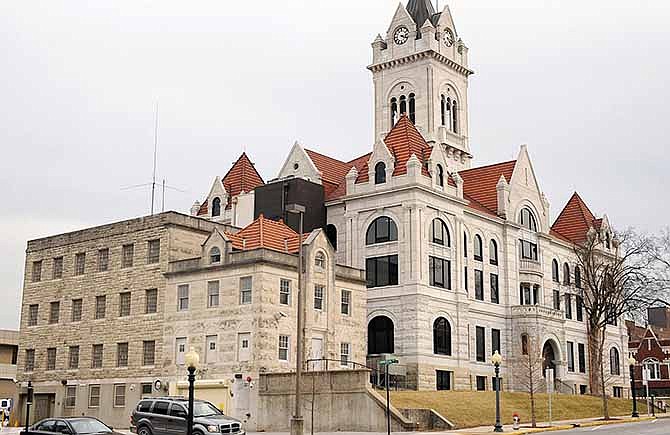As the Cole County Commission continues looking at possibilities for using space in the old county jail and sheriff's house behind the county courthouse, those who want to preserve the buildings have asked if space in the new county jail could take care of county office space needs.
The commission is scheduled to meet today with officials from Architects Alliance who have been developing plans for the commission on these two buildings, as well as court officials about what their needs are and if it is possible they could be met in the shell of the two buildings.
Commissioners have identified construction of a new, 2,200-square-foot courtroom as a priority.
To date, commissioners have looked primarily at two plans.
One plan calls for the remodeled sallyport to be left on the ground floor, and the three floors above it torn down and rebuilt. Officials with Architects Alliance told commissioners that this plan would cost approximately $1.6 million. There would be 4,700 square feet of court/office space available with this plan and 700 square feet for a lobby.
The other plan would keep the existing shell of the jail and sheriff's house in place, fix the three floors above the sallyport and develop a plan to access each floor since the floors in the old jail do not align with the courthouse. This plan would cost approximately $775,000 and offers 3,300 square feet of court/office space and 600 square feet for a lobby. It could take 10-12 months to complete the plan to tear down the old buildings and six months to complete the plan working within the current structures.
Presiding Commissioner Marc Ellinger has said a plan that would renovate the courthouse would not provide enough space for a large enough courtroom.
Those wanting to save the old jail and sheriff's house point out that there is plenty of space in the new jail for such a facility. Commissioners had put extra space in the new jail to accommodate for future growth.
However, according to the opinion of the county judges and research done by county attorney Jill Lahue, a courtroom cannot be located inside the new jail because a criminal trial cannot be held inside a jail or a prison unless the circumstances are extreme enough to override constitutional issues, such as a particularly violent and uncontrollable inmate. Lahue also said they can't have civil cases in the jail because that's not a law enforcement purpose.
Lahue and the judges cited case law that convening court in a county jail is inherently prejudicial, with several cases from across the country where having a trial in a jail or prison was to violate the Sixth Amendment of the Constitution, which deals with rights to a speedy and public trial.
In June 2010, before the new jail was completed, the county judges told the commission they probably wouldn't use a courtroom in the new jail enough to make it worth the money to build it.
"The law does not allow all of these proceedings to be conducted in the jail, but even assuming that they could, we've found that approximately one hour per week is all that the new jail courtroom would be used for proceedings involving inmates,"said Presiding Judge Pat Joyce, at that time. One reason this number is so low is that Cole County is already the statewide leader in using video hookups between the courthouse and the jail, she added.
"All contested matters, matters that can affect guilt or innocence, and matters involving witnesses or victims, cannot be done by video and cannot be done in a jail courtroom," she said. "The bottom line is that spending $500,000 on a new jail courtroom will not allow us to do anything there that we cannot do now by video, and video is safer and less expensive than a courtroom in the jail."
But there does appear to be one office that could be moved from the courthouse to the new jail.
The commission did mention possibly relocating the prosecuting attorney's office to the new jail because that office performs a law enforcement function. LaHue said the law enforcement sales tax statute allows for the expenditures, in this case, the cost of the jail, to be expended on law enforcement purposes.
However, commissioners do not believe moving that office, which is located on the third floor of the courthouse annex, would be able to accommodate the courtroom that is needed. Ellinger said that building was built using columns, which are never seen in courtrooms and there are a number of Americans with Disabilities Act issues that would have to be dealt with in the crosswalk between the annex and the courthouse.

